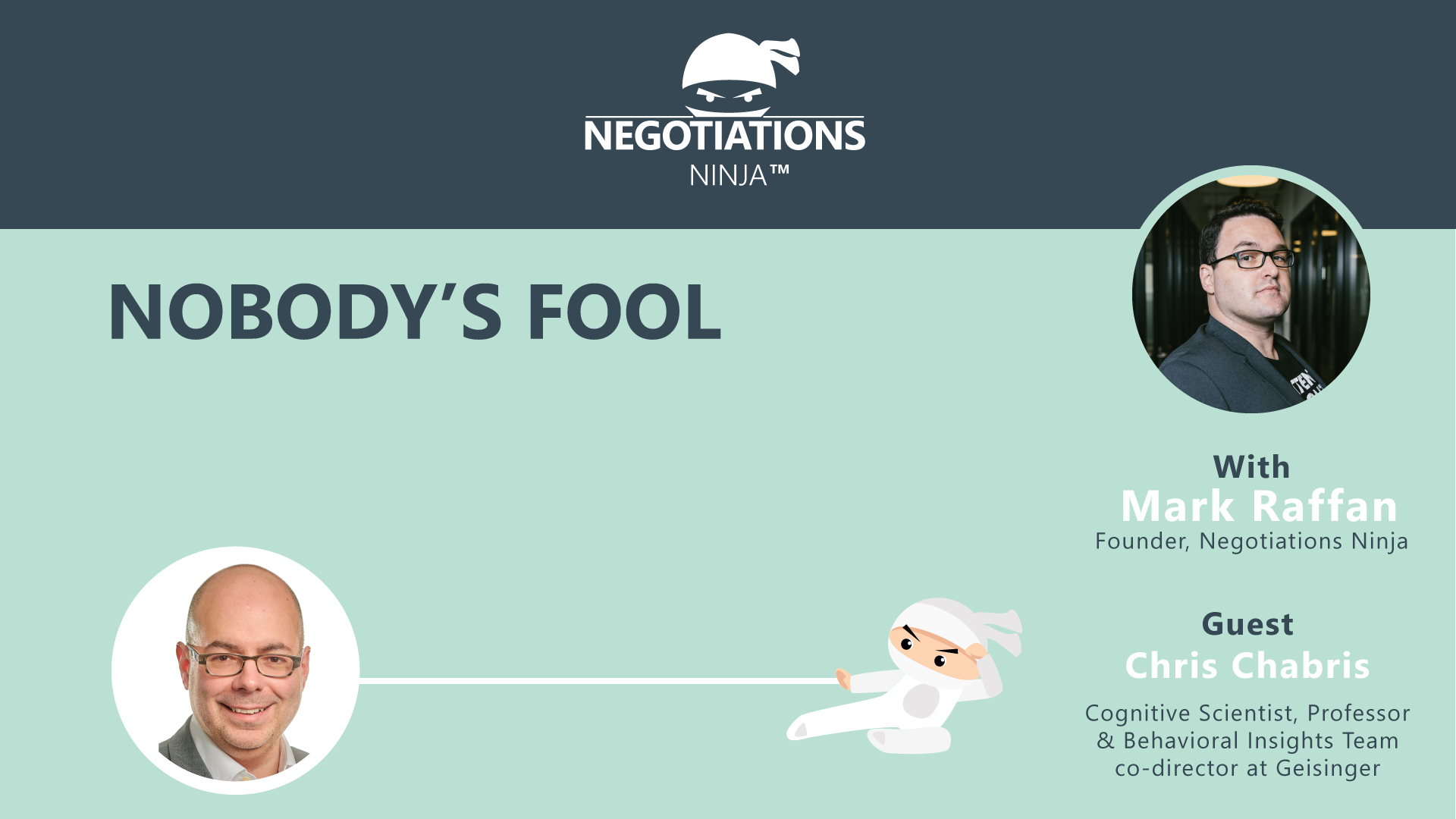Why are people so easily misinformed or manipulated?
In hindsight, it’s easy to question “How did that fool me?” But when you’re “in it” you don’t realize it. Why? Why are people taken in by things that are absurd? There are signs that we can learn to notice.
Chris wrote “Nobody’s Fool” to answer what it is about our minds and how they work that makes us vulnerable. They aren’t complicated things. There are “hooks” that deceivers and scammers exploit in our psychology.
So what are they? How can we become more aware? Chris shares how you can make sure you’re nobody’s fool in this episode of Negotiations Ninja.
Outline of This Episode
- [2:16] Learn more about Chris Chabris
- [2:34] Why are people so easily misinformed?
- [5:37] Why does the brain revert to truth bias?
- [8:16] How to become more aware of misinformation
- [11:38] Combating the “What you see is all there is” assumption
- [16:16] What information do manipulators seek?
- [20:44] Make sure you ask probing questions
Why does the brain revert to truth bias?
Humans tend to assume that everything we see, hear, or are told is true, i.e. we have a truth bias. Unless we have a reason to believe otherwise, we tag incoming statements as true. It takes an additional step for our brain to retag things as “false” or “uncertain.” That truth bias is the root of why we’re easily deceived. We don’t question everything we see and hear. But a truth bias is necessary.
Imagine a world where no one had a truth bias. What if you went to the supermarket, looked at a loaf of bread with a label that says “100 calories per slice,” and turned it over to verify the information? But how do you verify what the label says is true? Are you going to take it to a chemist to have it checked? It’s an infinite rabbit hole of checking. That’s why it’s adaptive to have a truth bias.
You can’t have a conversation if you analyze everything that ever came out of someone’s mouth. How can you coordinate behavior, work in teams, or build relationships? We need a truth bias. But we also need to learn how to avoid being taken advantage of. It is possible to become more skeptical.
How to become more aware of misinformation
“Fake news” used to refer to The Onion or The Daily Show. But it became a tool of misinformation and political manipulation—an outright false story. Fake news is accompanied by trappings of trustworthiness as if it came from a friend. That’s how misinformation spreads. That’s why we must vet that information with skepticism.
There are other ways to spread disinformation. One way is to claim something is related to a larger trend. Politicians will use one example of something they’re against and talk about it. But examples of something similar may have had an opposite outcome.
For example, a politician may share a story about an immigrant who was involved in a crime. But they won’t tell you the relative rate of crime comparing immigrants to non-immigrants because that would lend context to the conversation.
We are often persuaded by anecdotal evidence, testimonials, stories, etc. Whenever you’re given a curated information flow, you’re not getting an unbiased and random sample of information. You have to stop and think about the information you’re not getting. You’re only being fed the information they want you to see.
Combating the “What you see is all there is” assumption
You have to question: “What am I missing? What am I not being told?”
If you knew that information, would it sway your decision? Chris encountered ads for financial advice services. It would share a photo of a guy in a pink shirt and say that he recommended Amazon and Tesla before they took off.
Your first thought might be “He knows what he’s talking about.” But what about the stock picks he made that didn’t skyrocket? What things didn’t he pick that skyrocketed? He must have made other picks that you’re not being told about.
Just imagining what’s missing is enough to cast a new light on the decision. You need to consider all of the relevant information, not just what you’re being fed. Chris shares more strategies you can leverage so that you’re nobody’s fool in this episode.
Resources & People Mentioned
Connect with Christopher Chanris
Connect With Mark
- Follow Negotiations Ninja on Twitter: @NegotiationPod
- Connect with Mark on LinkedIn
- Follow Negotiations Ninja on LinkedIn
- Connect on Instagram: @NegotiationPod




